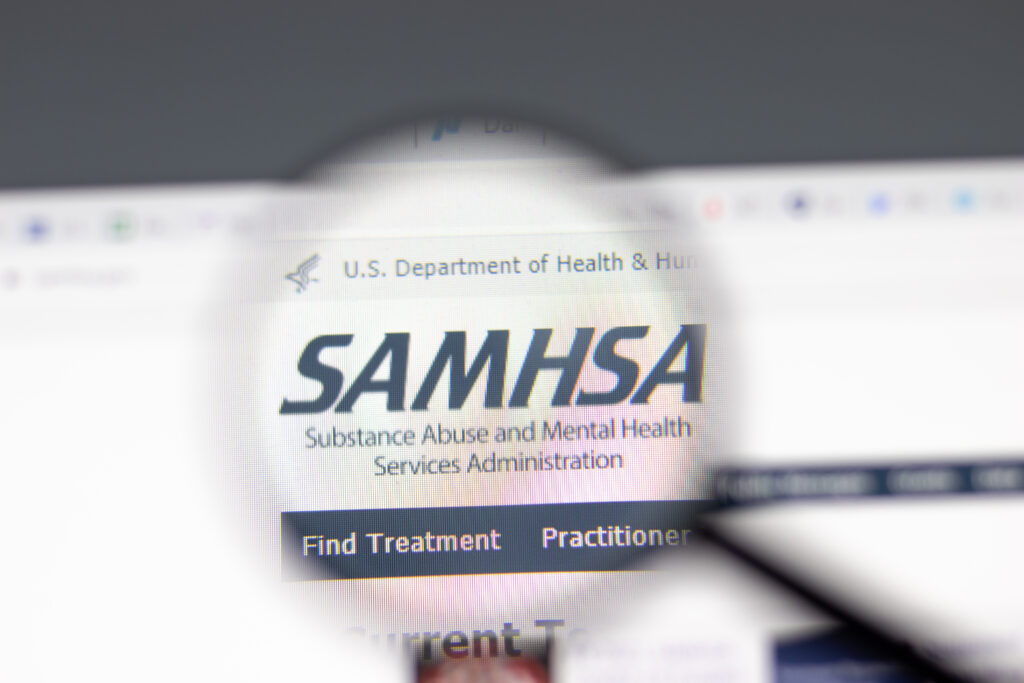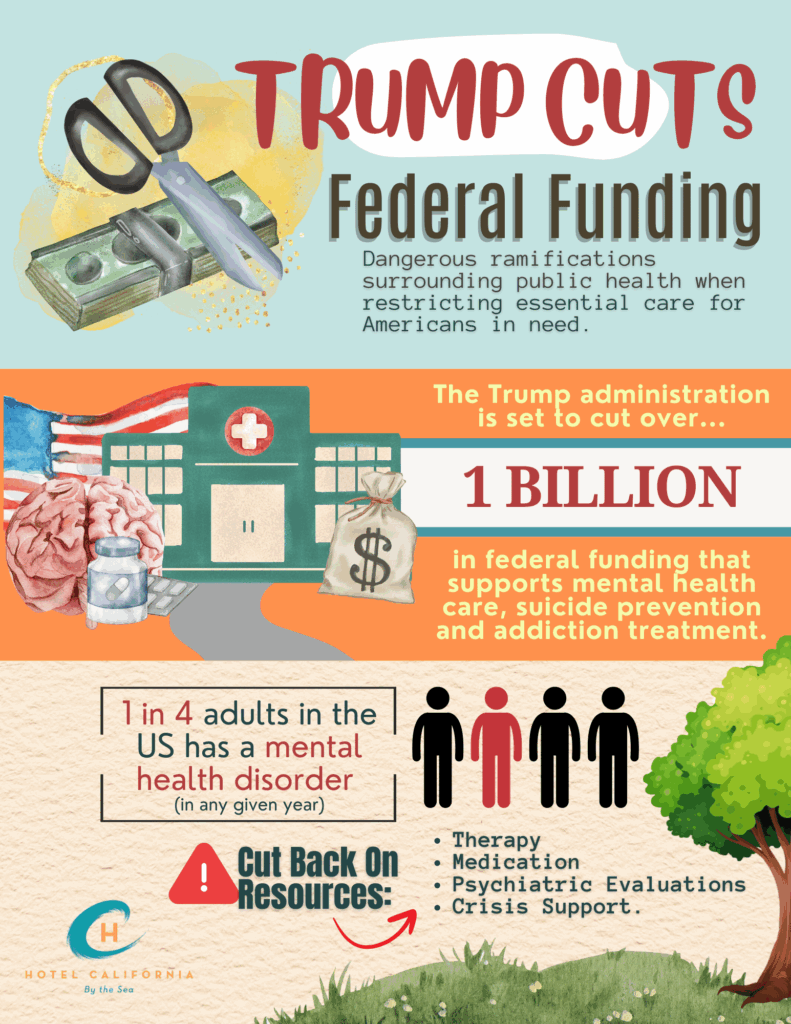Trump cuts Federal Funding to Mental Health and Substance Use Services
In an attempt to decrease the national budget deficit, Trump cuts federal funding to some agencies that impact mental health and behavioral health care. The Trump administration is set to cancel more than a billion dollars in unspent mental health, behavioral health and substance use block grant funds that have already been allocated for state use. The withdrawal of this federal funding could leave many states scrambling to accommodate some of the most vulnerable populations in need of this type of medical care.

During the Biden Administration, a large amount of money was provided to the Mental Health Block Grant and Substance Abuse Prevention and Treatment Block Grant. This provided about $1.3 billion for states to allocate as needed. However, states now have until September 30 to spend the money because the new administration will be terminating the grant on March 24, 2026.
In March, an announcement was made that the Substance Abuse and Mental Health Services Administration (SAMHSA) and the Health Resources and Services Administration (HRSA) would merge together to become a new agency called the Administration for a Healthy America (AHA). SAMHSA oversees issues related to behavioral health. HRSA oversees medical information pertaining to primary care. Federal cuts to both of these agencies can disrupt critical research and programs that help people with mental illnesses get well and stay well.
Proposed budget cuts could total around $18 billion from the National Institute of Health and about $1.1 billion from programs under SAMHSA. It can result in mental health symptoms getting worse, put people out of work, put more people on the streets, put more people in jails and put more people in the ER.
Substance Use Disorder
In 2023, an estimated 50 million Americans age 12 or older met the criteria for having a substance use disorder. This can be an addiction to alcohol, prescription drugs or other types of mind-altering substances. Research found that about 1 in 4 adults in the US has a mental health disorder in any given year.
Opioid treatment programs often depend on SAMHSA. More than 1900 programs exist nationwide. These programs collectively help more than 600,000 people each year. SAMHSA also oversees the National Survey on Drug Use and Health, which provides important data and information on mental health and behavioral health. This information is used to help shape policies that provide funding, tools, resources and support for those who benefit.

What are the implications of Trump cuts on Federal Funding?
The National Survey on Drug Use and Health
One important agency that will be impacted by these federal cuts is the Substance Abuse and Mental Health Services Administration (SAMHSA). They conduct the National Survey on Drug Use and Health, which is a federal survey on mental health problems and substance use across the country. It has been run for decades and is used by many researchers, scientists and clinicians. This annual survey is the largest survey in the country.
The National Survey on Drug Use and Health provides a comprehensive view on drug use and mental health in the US. Established in 1971, the survey has become a primary source of information on how many people in the nation are experiencing depression, how many people have access to psychotherapy, how many people want addiction treatment, how many people have not been able to get treatment and how many people smoke and drink.
Trump’s budget cuts and cuts in the federal workforce in mental health and substance abuse services have many worried about an uncertain future. The annual survey is being dissolved along with a number of federal health agencies under Robert F. Kennedy Jr.’s newly proposed Make America Healthy Again agency. On April 1, the 16-person team of statisticians and scientists working on the survey lost their jobs in the mass federal layoff.
The annual survey provides first-hand experience to help better understand the prevalence of substance use, substance use disorders, mental health outcomes and treatment and recovery for people across the nation. The survey also provides insight into who and where the country needs the most help. Where do they live? What are their issues? How can resources be provided to them? It is important data that can help researchers, scientists and medical providers understand the trends. Much of the data is critical for research in various aspects of public health, mental health and behavioral health.
Despite the layoffs, which were a result of federal budget cuts, press secretary Emily Hilliard, at the Department of Health and Human Services, says the survey will continue. It will continue to be managed under the new agency the Administration for a Healthy America. However, it is unclear how the survey will continue without the team of scientists.
Check Your Insurance Coverage for FREE
Find out if your insurance covers addiction treatment in minutes. We accept most insurance!
Changes to Medicaid
With federal budget cuts looming, many are worried that they can impact Medicaid spending. Congress has called for billions of dollars in cuts to areas of the federal budget that include programs for mental health and are also tied to Medicaid. Medicaid is a joint state and federal health insurance program for low-income populations. It allows for millions of Americans to have access to behavioral health services such as therapy, medication, psychiatric evaluations and crisis support.
Medicaid covers healthcare for an estimated 72 million Americans with low income or disabilities. It serves as the financial foundation for most community-based mental health centers. In California alone, about 4 out of 10 Californians rely on Medicaid. It helps pay for some of the state’s social support services for the most vulnerable residents. Services such as housing resources and food assistance. In fact, the majority, if not all, of California’s behavioral health policies are connected with Medicaid.
With the federal cuts, it could mean less Medicaid money and therefore, less money to help in efforts of mental health, behavioral health and substance abuse treatment. The threats to cut federal funding come during a time when half of the adults in the state of California have reported symptoms of anxiety and depression. An estimated 1.2 million adults in the state live with serious mental health issues, according to data from the National Alliance on Mental Illness (NAMI). The federal cuts on Medicaid can lead to major issues for those depending on it for behavioral and mental health treatment and resources.
Reach out to Hotel California by the Sea
We specialize in treating addiction and other co-occurring disorders, such as PTSD. Our Admissions specialists are available to walk you through the best options for treating your addiction.
Treatment for Substance Use Disorder
The cuts on federal funding to agencies that support mental health care, suicide prevention and addiction treatment could have dangerous ramifications. Many behavioral health organizations are already stretched thin with tools and resources. This type of uncertainty could make it more difficult for organizations and for states to make other plans when it is still unclear how the cuts will be delegated.
The federal government could roll back on spending in many different ways including imposing specific work requirements, restructuring funding formulas, restricting how Medicaid funds are being used, end federal waivers and even dictating how states use money from the program. The US is still in the middle of an opioid drug epidemic and a constant wave of mental health problems.
Behavioral treatment programs such as Hotel California by the Sea provide substance use disorder treatment as well as treatment for co-occurring mental health disorders. We offer treatment at all levels of care including detox, residential, PHP and IOP. We utilize evidence-based treatment methods such as CBT, DBT and EMDR therapy. Hotel California by the Sea is dedicated to helping clients reach their goals of sobriety and overcome their addiction.
References:
https://www.npr.org/sections/shots-health-news/2025/05/08/nx-s1-5389885/medicaid-payments-barely-keep-hospital-mental-health-units-afloat-federal-cuts-could-sink-them
https://www.sciencenews.org/article/mental-health-care-addiction-samhsa
https://calmatters.org/health/mental-health/2025/04/medicaid-cuts-behavioral-health/
https://www.nami.org/press-releases/nami-statement-on-proposed-federal-funding-cuts-for-fy-2026/
https://eleos.health/blog-posts/behavioral-health-funding-concerns-2025/
